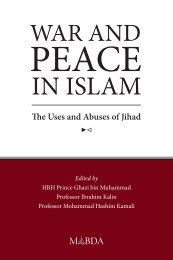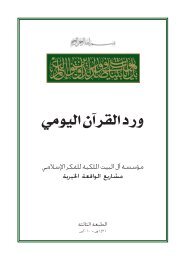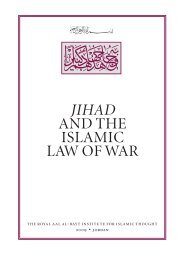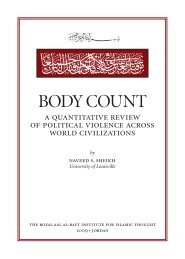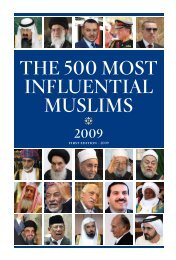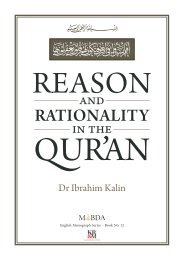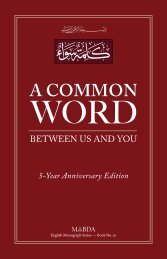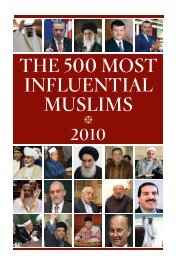the 500 most influential muslims - The Royal Islamic Strategic ...
the 500 most influential muslims - The Royal Islamic Strategic ...
the 500 most influential muslims - The Royal Islamic Strategic ...
You also want an ePaper? Increase the reach of your titles
YUMPU automatically turns print PDFs into web optimized ePapers that Google loves.
IIIa. traditional islam (continued)<br />
ibadi (0.5% of <strong>the</strong> world's traditional <strong>muslims</strong>)<br />
<strong>The</strong> Ibadi school has origins in and is linked to <strong>the</strong> Kharijites, but <strong>the</strong> modern day<br />
community is distinct from <strong>the</strong> 7th century <strong>Islamic</strong> sect. It was founded after <strong>the</strong><br />
death of Prophet Muhammad and is currently practiced by a majority of Oman's<br />
Muslim population. Also found across parts of Africa.<br />
shi‘a (9.5% of <strong>the</strong> world's traditional <strong>muslims</strong>)<br />
<strong>The</strong> second-largest denomination of Muslims referred to as Shi‘atu ‘Ali<br />
or '<strong>the</strong> party of ‘Ali,' <strong>the</strong> fourth caliph of Islam and first Imam in Shi'ism.<br />
branches<br />
Twelvers (8%)<br />
Named after <strong>the</strong><br />
followers of Imam Ja'far<br />
al Sadiq (702-765 CE/<br />
83-148 AH) in Medina.<br />
Isma'ilis (Seveners)<br />
(Less than 0.5%)<br />
Named after <strong>the</strong><br />
followers of Muhammad<br />
ibn Ismail (746-809<br />
CE/128-193 AH) in<br />
Medina.<br />
Zaidis (Fivers)<br />
(Less than 1%)<br />
Named after <strong>the</strong><br />
followers of Imam Zaid<br />
ibn ‘Ali (695-740 CE) in<br />
Medina.<br />
schools of islamic law<br />
Usuli<br />
99% of Twelvers. This dominant school favors<br />
<strong>the</strong> use of ijtihad, independent legal reasoning,<br />
with an emphasis on four accepted collections<br />
of Hadith. Derive legal opinions from living<br />
ayatollahs, or mujtahids, whose rulings become<br />
obligatory. Taqlid, <strong>the</strong> practice of following<br />
rulings without questioning <strong>the</strong> religious<br />
authority, is a core tenet of this school. <strong>The</strong><br />
name Usuli is derived from <strong>the</strong> Arabic term usul<br />
meaning 'principle'.<br />
Akhbari<br />
Akhbaris reject <strong>the</strong> use of ijtihad or reasoning,<br />
and do not follow marjas who practice ijtihad.<br />
<strong>The</strong>y also prohibit exegesis of <strong>the</strong> Qur’an. Derive<br />
legal rulings from <strong>the</strong> Qur’an, Hadith, and<br />
consensus. <strong>The</strong> name Akhbari is derived from<br />
<strong>the</strong> Arabic term akhbar meaning 'traditions'.<br />
<strong>The</strong>y can trace <strong>the</strong>ir roots to <strong>the</strong> followers of<br />
Muhammad Amin Astarabadi (d. 1627 CE).<br />
Akhbaris continue to exist to this day, although in<br />
small, concentrated pockets, particularly around<br />
Basra, Iraq.<br />
15



